Racial unity is a gospel issue and all the more urgent 50 years after the events of 1968. Join the The Gospel Coalition and Ethics & Religious Liberty Commission at a special event, “MLK50: Gospel Reflections from the Mountaintop,” taking place April 3-4 in Memphis. Key speakers include Russell Moore, Benjamin Watson, Ralph West, John Piper, Jackie Hill Perry, Matt Chandler, Eric Mason, and many others. Learn more here.
When Toronaka Houston walked into the first day of teaching second grade at Lucie Campbell Elementary School in Memphis, Tennessee, she was scared to death.
It wasn’t that she was new to teaching. Houston had 12 years of experience under her belt, all of it at a middle-class public school in Memphis.
But Lucie Campbell was completely different. It’s a Title 1 school, which means it has high numbers of children from low-income families. (In fact, 95 percent of its students are eligible for free or reduced lunch.) In 2015, only a quarter of them tested proficient in math and reading/language arts. As one of the lowest-performing 5 percent of schools, it had to either improve or be taken over by the state.
Houston’s principal, Jaron Carson, had a vision for the lower-performing, inner-city schools. He landed a job at Lucie Campbell and asked her to come along.
After a lot of hesitation, she agreed. “I want to be a helper,” she said.
The school she stepped into was nothing like the one she left. In the 2012–2013 school year, there were eight serious incidents related to student discipline (this category includes things like possession of weapons or aggravated assault). In the 2014–2015 year, more than 18 percent of the students had received an out-of-school suspension. (The median percentage of students receiving out-of-school suspensions in Tennessee that year was 1.4 percent.) At the same time, a whopping 44 percent of Lucie Campbell students had missed more than 15 days of school, compared to a statewide average of 6 percent.
“The first year I woke up many days crying,” Houston told TGC. “I lost 25 pounds.”
But there were also bright spots, and one of them was a simple reading program brought in by a church.
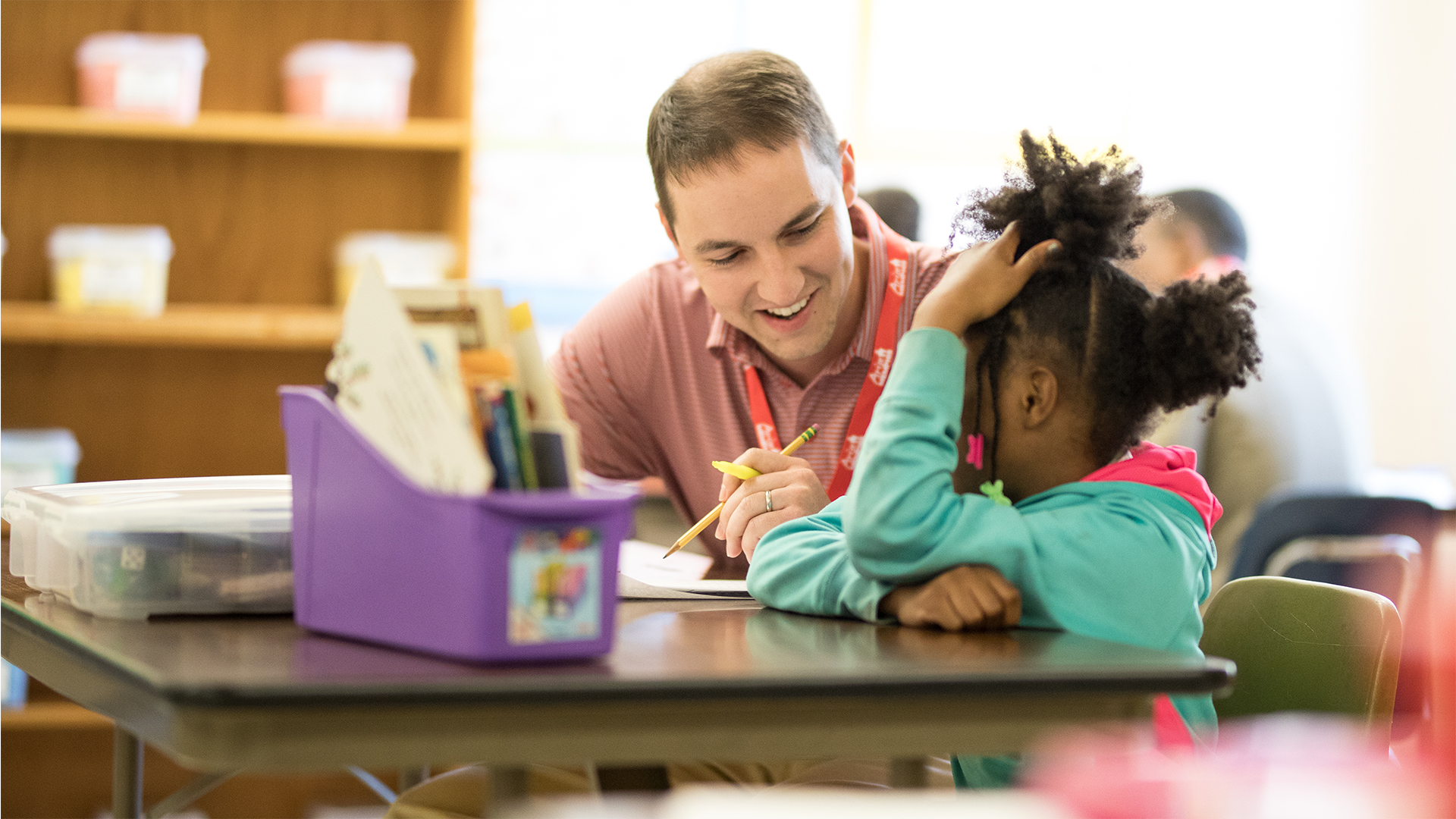
Arise2Read was created by Donna Gaines—wife of Southern Baptist Convention (SBC) president Steve Gaines—in 2013. Each week, volunteers read and work on sight words with second graders for an hour.
“We are having unbelievable results,” she said. “Last year, in 13 schools, the children had a 142 percent increase of reading on sight-word grade level.”
In five years, Arise2Read has grown to 822 volunteers working in 28 Memphis-area schools. Reading to students led into starting Good News Clubs, sponsored by Child Evangelism Fellowship. It led to appreciation meals for teachers and uniform drives for children who didn’t have enough clothes. It led to coat donations, food pantries, and local pastors connecting with families in need.
And that was before compassion ministry agency Send Relief got wind of it.
“Any large urban area has the effects of forgotten-about schools,” said Send Relief president David Melber. After he heard about Arise2Read, using it to connect churches with local, under-resourced public schools seemed obvious.
He invited Gaines to train pastors, ministry leaders, and planters in Orlando and Dallas last summer, then asked her to do the training again at Send Relief headquarters in March. Planters from a dozen states have already asked Gaines more about how to implement the program.
“To teach a child they have value and worth—this may be the only place they ever heard that,” Melber said. “It’s a great privilege for us to do that.”
It’s a motivation that holds, even though test scores rise and dip.
“The Lord commands us to love our neighbors as ourselves,” Gaines said. “These children are my neighbors. That is my motivator, and has given me a real sense of urgency.”
‘Most Alarming Thing’
The “most alarming thing” about moving to Memphis was the startling poverty, Gaines said. She grew up in the city, leaving in 1980 to go to college, marry Steve Gaines, and get her master’s in education.
In 2005, she moved back when Steve took over as pastor of the 7,000-attendee Bellevue Baptist Church.
“Once we moved in, we looked at the demographics and realized we’d had an explosion of poverty and blight,” she said. The city routinely shows up on the lists of the worst places to live, with high rates of both poverty (about 27 percent) and crime (1,740 incidents per 100,000 people, or five-times the national average).
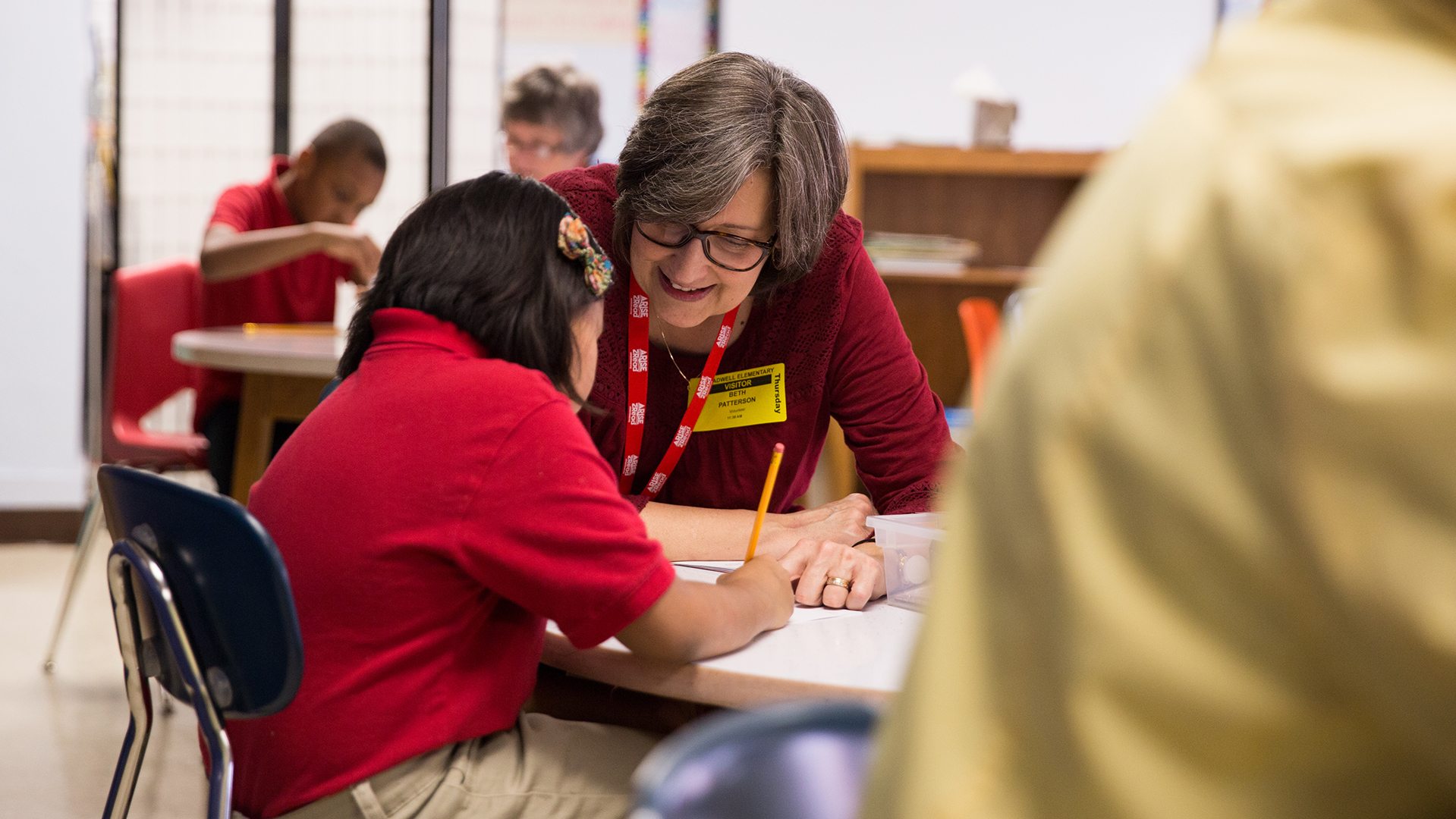
Bellevue is in a suburb northeast of Memphis, about 22 minutes from downtown. Under Steve’s leadership, the church started reaching into the city—resodding football fields, painting and cleaning up schools, and starting a mobile dental clinic.
“I started tutoring on Tuesday afternoons,” Gaines said. She worked with a faith-based charter school, tutoring at-risk—and later refugee—children.
“They made tremendous progress,” she said. “I started thinking, How can I reach a greater number of these children?”
At the same time, Memphis City School District was dissolving itself in order to join with the Shelby County School District. The process was contentious and confusing, and just about everybody—from the state to the city council to the school board members—filed lawsuits.
Gaines was watching and praying. “I don’t know any other way to describe it—the eternal pierced the temporal, and God captured my heart,” she said. “It was a call to action. This is your city. . . . What are you doing about it?”
Adopt-a-School
She called the school district, where a volunteer coordinator told her they were looking for more faith-based organizations to adopt schools.
Gaines perked up.
The district was also looking for volunteers to come in to help second graders learn to read, the coordinator said.
Gaines perked up even more. Child literacy is something she can’t stop talking about.
“Children living in poverty are, on average, three grade levels behind by fourth grade,” she told TGC. “And if they aren’t reading proficiently by the end of fourth grade, statistics show two-thirds will end up on welfare or in prison.”
In Memphis, where the median household income is $37,000, about 43 percent of the children live in poverty.
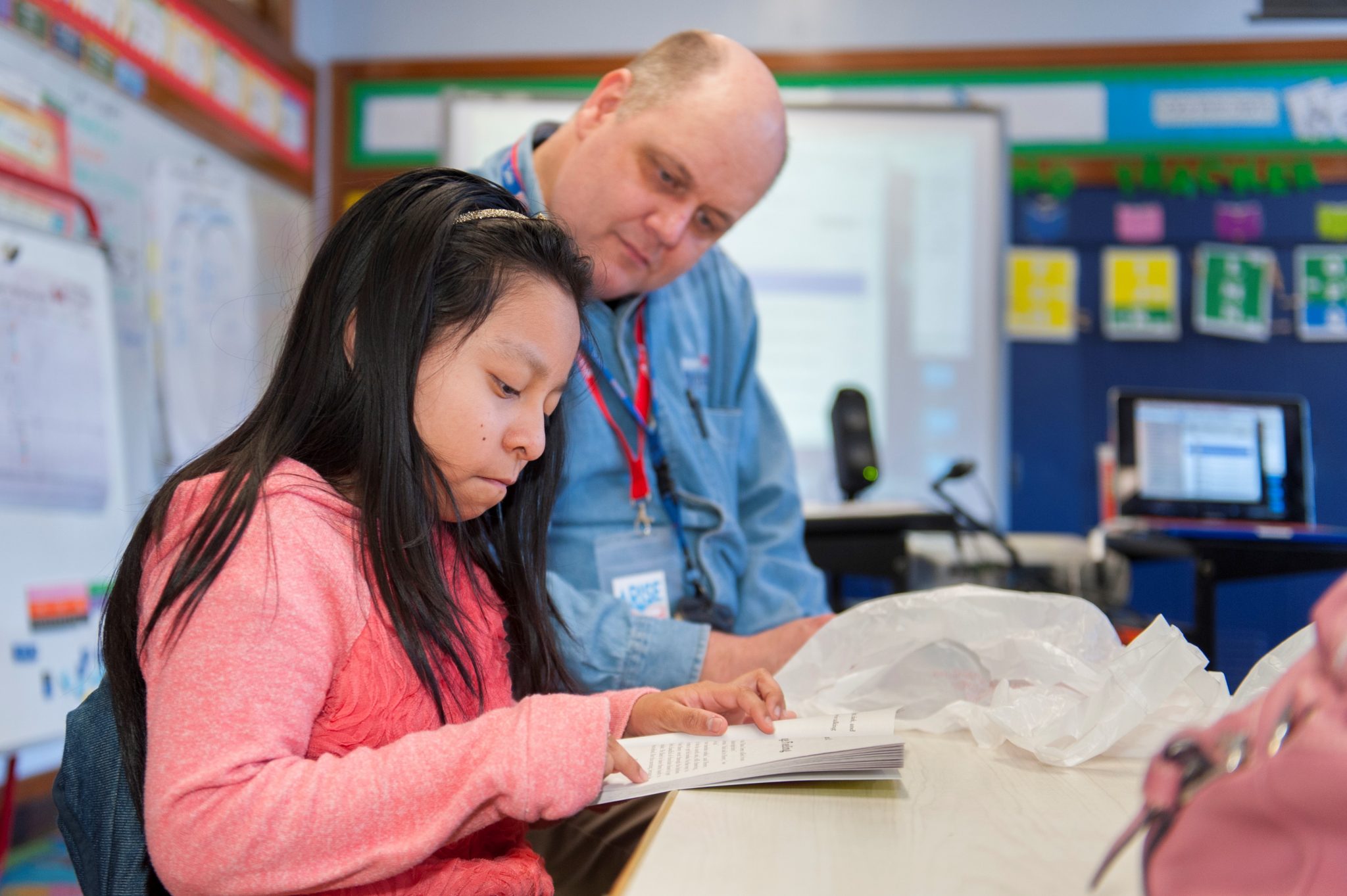
“But here’s the good news,” she said. “Children in poverty who read proficiently by the end of third grade have an 89 percent graduation rate.”
And those who graduate from high school make significantly more money than those who don’t (a median weekly income of $692, compared to $504). That’s a big jump, and Memphis needs it. The median annual income of a Memphis household is just $37,000, compared to $59,000 nationwide.
“It’s going to take the gospel and education to break the cycle of generational poverty,” Gaines said.
Know You Care
The public school system had already made a start at a volunteer-staffed reading program called Team Read. They handed volunteers the Fry sight word list (1,000 of the most common English words) and asked them to review them with students.
Gaines explained the program to Bellevue and asked for volunteers. She needed 110 to cover the second graders at Treadwell Elementary School; she got more than 200.
“We covered third grade also,” she said, “and then started putting them in other schools.”
Her team tweaked the program as they went, eventually creating a half-hour curriculum. First, volunteers read one-on-one with a child until he or she misses five sight words. Then the child reads the five words again, writes them, and play games with them. Toward the end of the session, the child and volunteer read together again.
At the end, the child can take a book home.
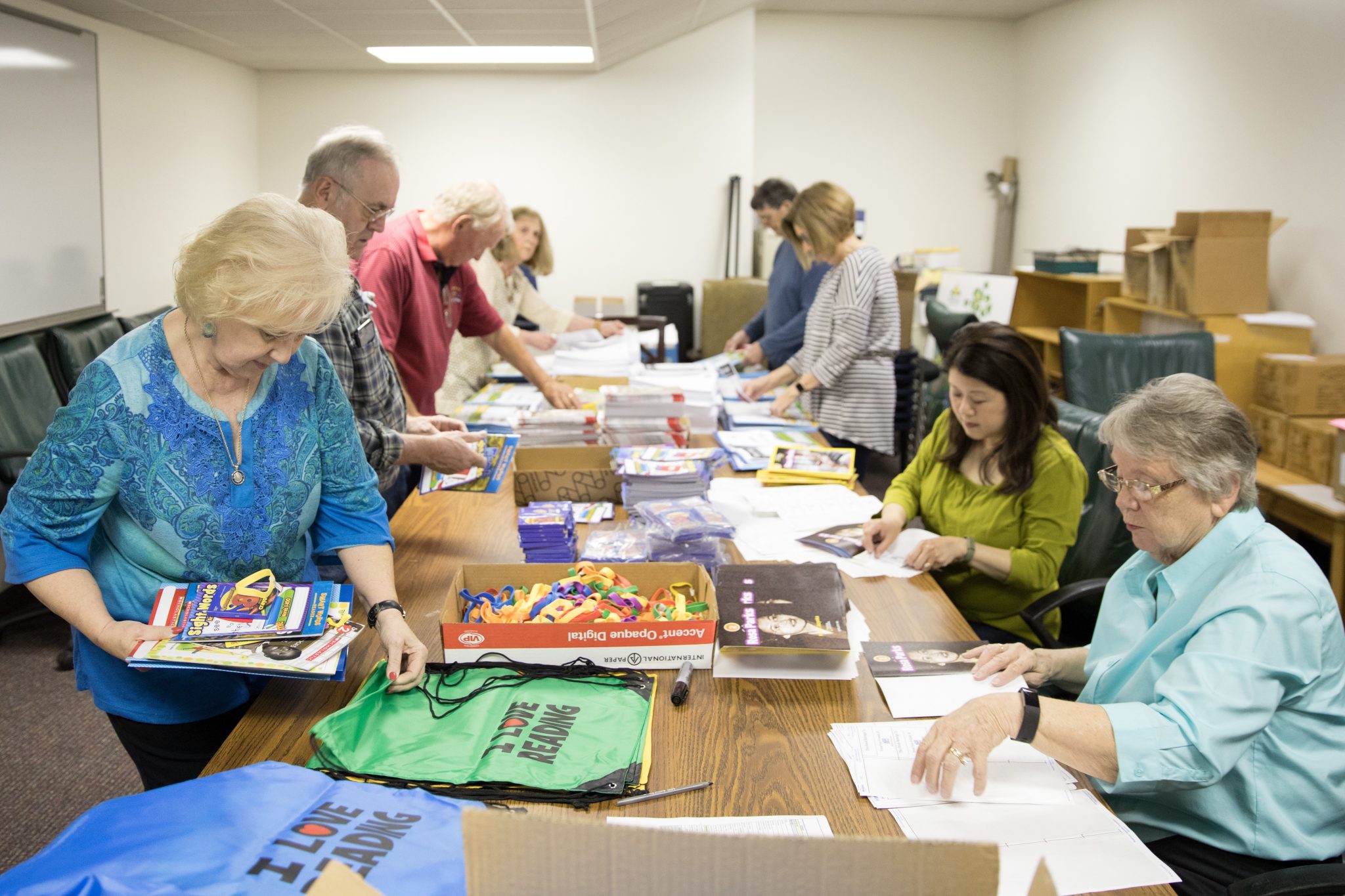
“It sparks incentive,” Houston said. “I notice a difference [in the students]. It sparks an interest in them—they want to learn to read. . . . Our achievement scores are definitely improved in reading this year.”
But overall, scores at Lucie Campbell are dropping. In 2012–2013, the elementary school scored a 5 on the state test that measures student literacy growth—the best on Tennessee’s five-point scale. But literacy growth dropped to a 3 in 2013–2014, then a 2 in 2014–2015. In 2015–2016 and 2016–2017, under a more rigorous testing system, Lucie Campbell fell to a 1.
That drop was more gradual than Shelby County, which scored a 5 from 2012 to 2015, but dropped in 2016–2017 to a 1. (It’s hard to pull a bigger lesson from the scores, as the average ACT composite score for Shelby County stayed around 17 for the past three years, and the graduation rate climbed steadily from 75 percent to almost 80 percent.)
Still, Houston and Gaines know the program is working. A pre- and post-test of Fry word recognition—done just on the second graders who worked with Arise2Read volunteers at 13 schools—showed a score increase of 142 percent in 2016–2017. At Treadwell Elementary, 78 percent of second graders read sight words on grade level, compared to one-third of students system-wide. They had gained an average of 408 words over the school year.
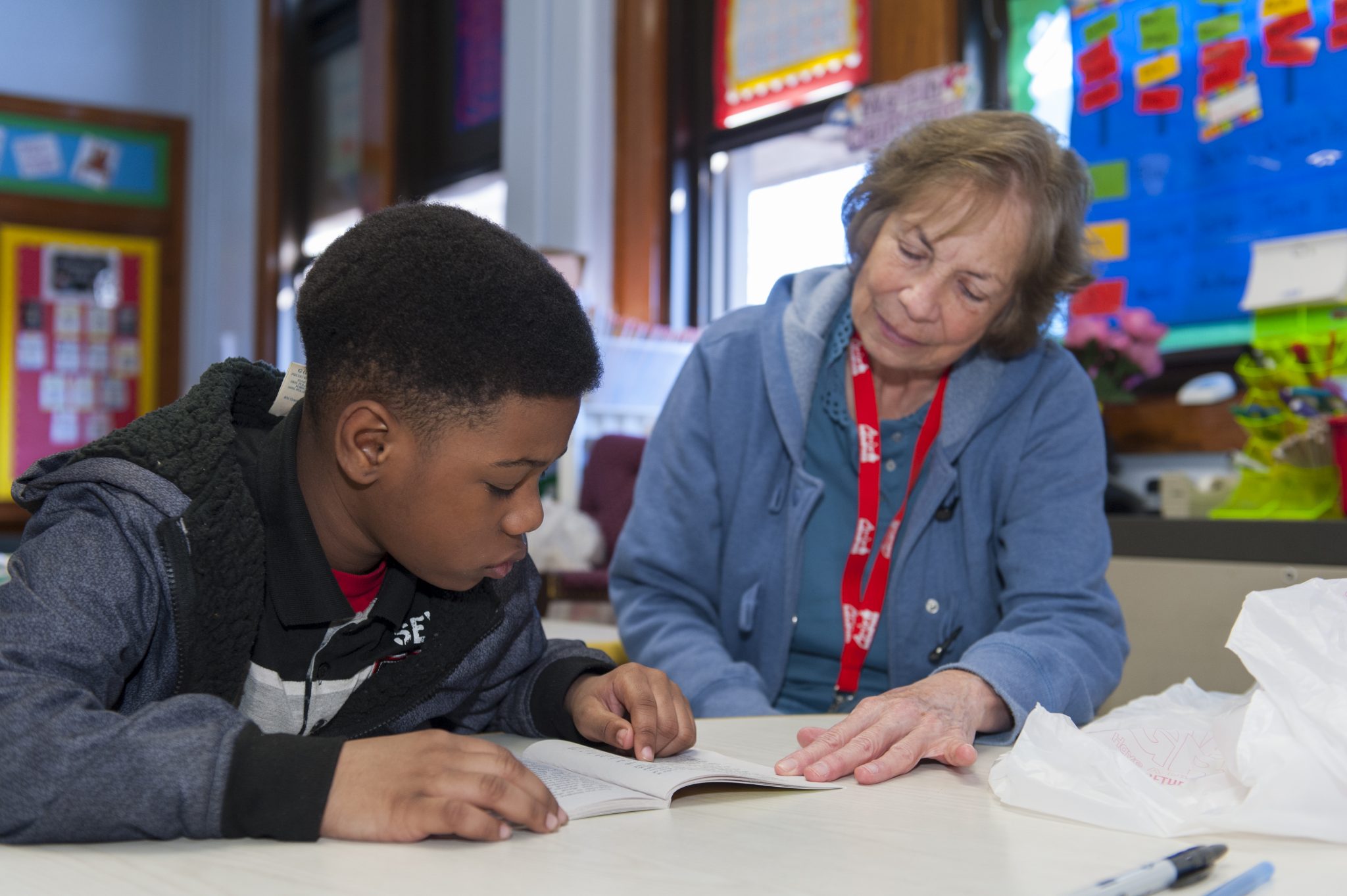
“Donna and her team are really God-sent,” said Dorsey Hopson, superintendent of Shelby County Schools and a member of Fellowship Memphis Church. “I spoke at their training, and saw people who clearly have a heart for God that translates into a heart for the city.”
Houston noticed the same thing. “You can tell [Arise2Read] is Christian-based because of their attitude. The volunteers are so loving, and the kids love it.”
The faith of the volunteers is more than a side benefit, because one of the most important things Arise2Read does is connect children with another adult who cares for them.
“You can’t teach [students of poverty] anything until you build a relationship with them,” said Arise2Read executive director Karen Vogelsang. She spent most of her career teaching in Memphis’s inner-city schools.
“They have to know that you care, that you believe in them,” she said. “When I saw the students arrive for their session, their faces lit up when they saw their coaches—I knew then that one of the program’s priorities was relationship building.”
‘Run Into the City’
Lisa Haywood is a pharmacist, not a teacher. She goes to Bellevue Baptist, and heard the pitch Donna made for volunteers.
“I feel like I don’t have the gift of teaching,” she said. “But I felt the Lord tugging on my heart.”
She felt a little more confident after her training, and a lot more confident as soon as she sat down with her first student.
“They light up,” she said. “It’s more than just teaching to them. To go week after week, and see their little faces light up—it’s somebody in their life that’s consistent. Week after week, we’re going to be there to tell them they’re doing a good job and that we’re proud of them.”
Volunteers like Haywood come in for one hour a week, splitting that time between two children. They come primarily from churches and Christian businesses that “adopt” a school, trying to provide enough volunteers for each second grader.
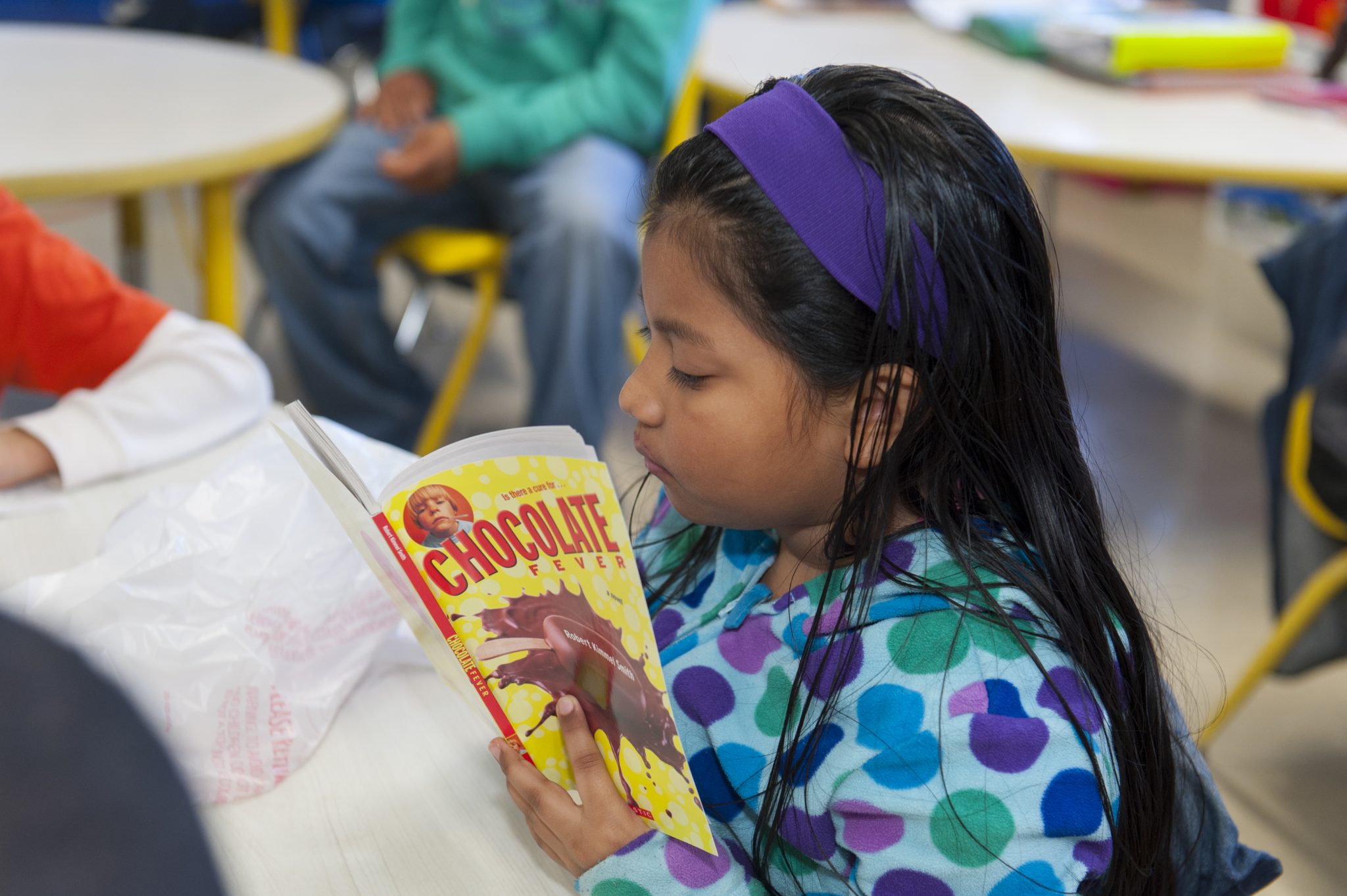
Not every week brings heady joy or even steady improvement.
“Some days when my students come in, they seem sad or disconnected, and that’s when I worry about what may be going on at home,” she said. “On those days when they have trouble focusing or don’t seem to want to try, it can be discouraging worrying about their progress. But they are still getting one-on-one attention, and that’s better than nothing.”
The relationships between volunteers and students “pour over into the lives of some of the families of these children,” Vogelsang said.
When the father of one student was hospitalized, Gaines contacted a local pastor. He was there for the family as the father passed away, eventually leading the mother to Christ. Now the family has joined his church.
“There have been so many stories of what I call ‘spin-off ministries’ once the volunteers get into the schools and see the needs,” Gaines said. “People get in there and fall in love with the children and want to do more.”
One retired couple saw their students needed clothes. They asked the school guidance counselor for sizes and colors needed for the uniforms, then organized a clothing drive at their church. The husband added shelves and a door to a closet in the counselor’s office, so she could store the clothes and disperse them as needed.
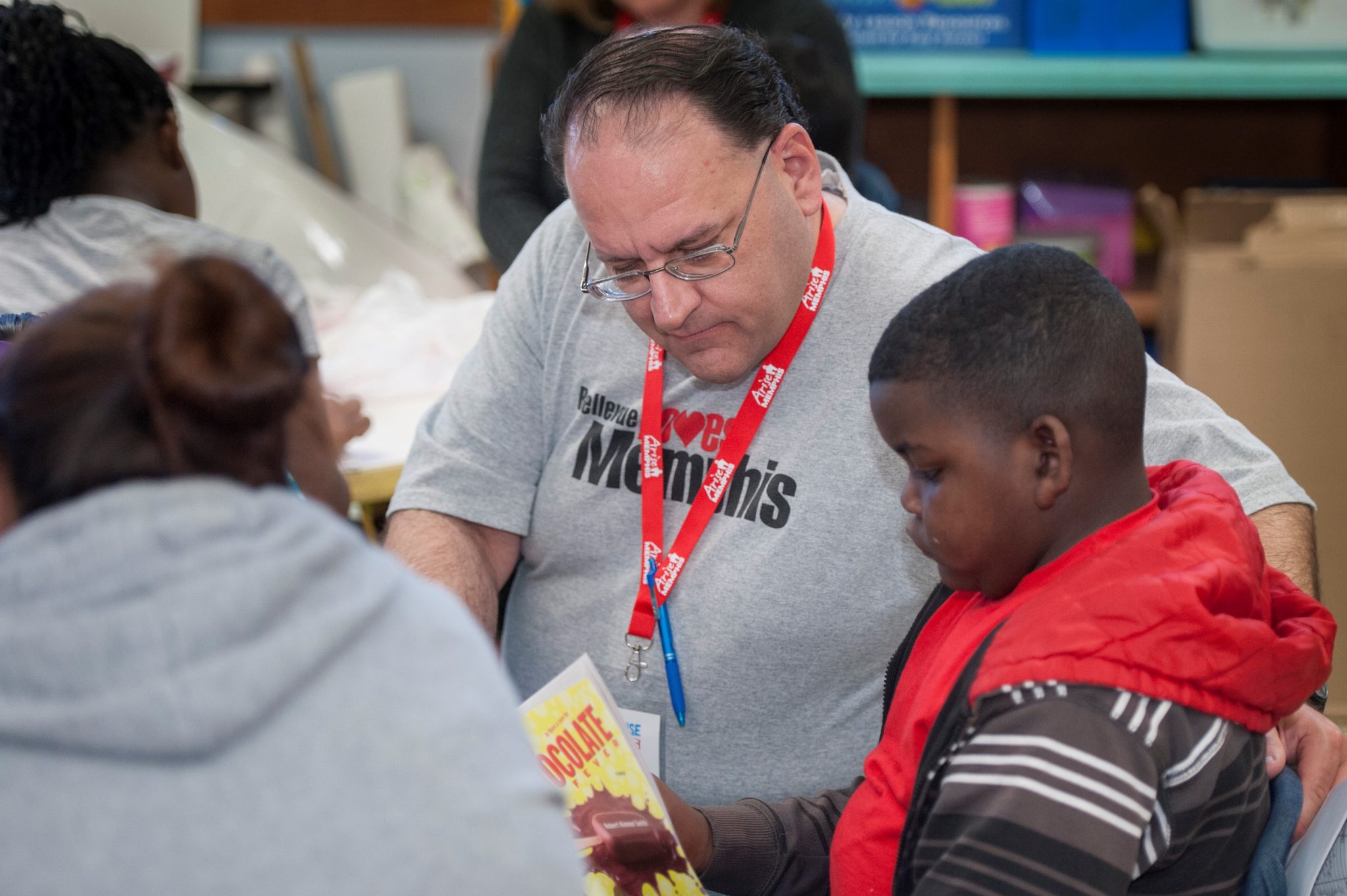
Many volunteers bring food along.
All but three schools in the Memphis district are Title 1 schools, which means the children “get breakfast and lunch and snacks two to three times a day, but they might not have a snack if they don’t bring one,” Gaines said. “And some of them eat early. They might eat at 10:30 a.m. and get out after 4:00 p.m.”
Often teachers purchase snacks with their own money; now, Arise2Read volunteers do as well.
Gaines herself has been working with a single mom of eight. The woman’s father is deceased, and her mother has spent her life in and out of drug and alcohol rehab.
“She has no safety net or training,” Gaines said. “I’ve been helping her with her children and with her job skills and with her rent so they can stay stable. In getting involved with her, I realized she doesn’t have the things I have or my children have, so how can I expect her to think the way we think?”
Gaines is mentoring by modeling—inviting the woman to church, having her over for dinner, and showing up when one of her boys got in trouble at school.
“How can I love my neighbor the way I love myself?” she said. “I do for her what I’d do for one of my daughters.”
Gaines is also working to connect a Good News Club to each of her schools, finding volunteers and promoting the program. Arise2Read volunteers can’t talk about God during their program, but the extracurricular club can explain the gospel and hand out free Bibles.
“For so long Christians have run from the city,” Gaines said. “I believe God is saying, ‘Run into the city. Be the salt and light that I have called you to be, and preserve a dying, decaying society.’ He is enabling us to do that with the least of these, our children. We cheer them on to be productive citizens and, hopefully, one day to sit down and read the Bible themselves.”
On a Roll
Volunteers get snagged on the numbers—the rate of poverty, the rate of Arise2Read’s success—and stay for the children, Gaines said. Retired people, stay-at-home moms, and employees on their lunch breaks volunteer and then volunteer again the next year; Arise2Read’s retention rate hovers between 82 percent and 85 percent.
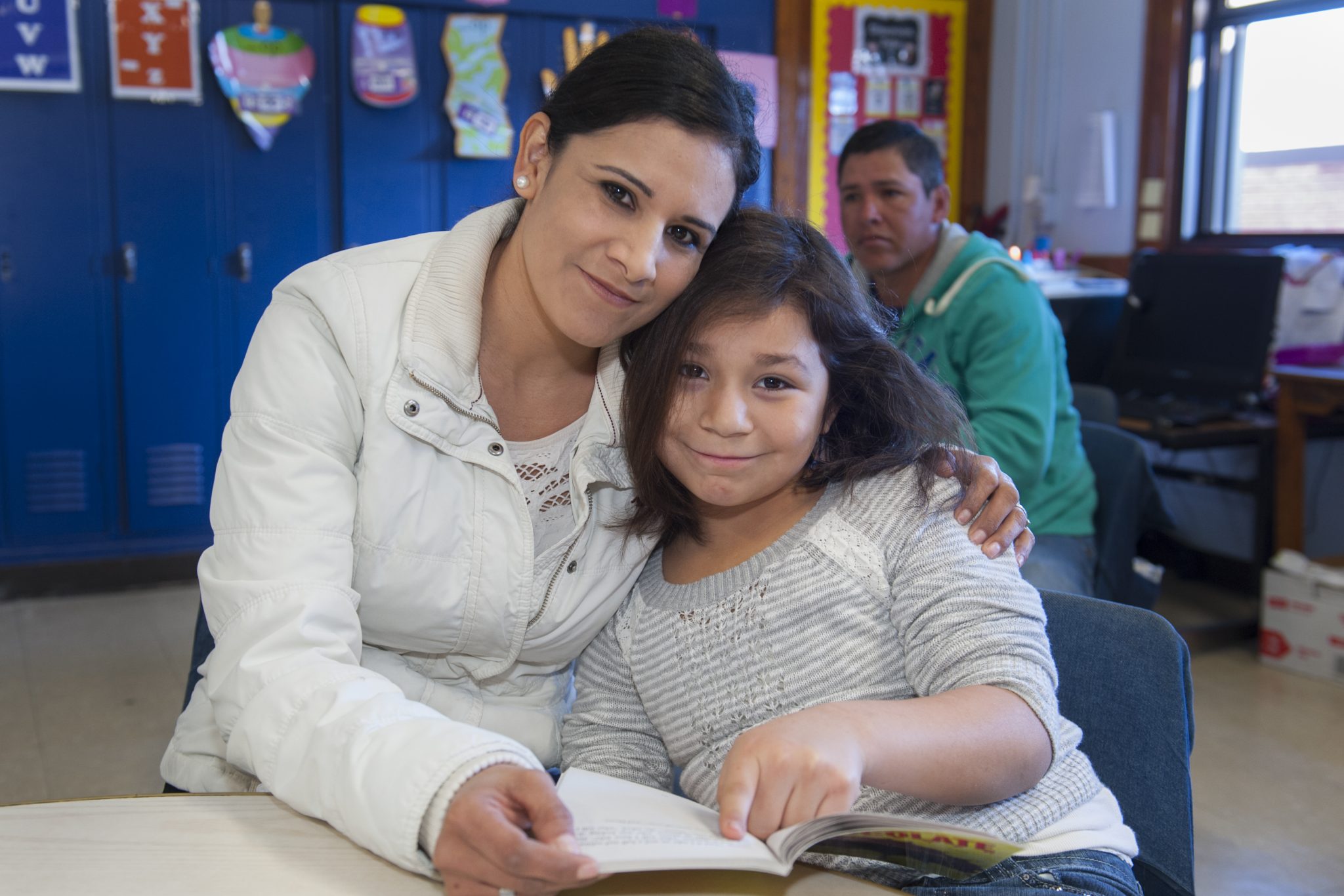
One of them is Rufus Smith, pastor of the 6,600-member Hope Church.
“I was educated in the poorest school district in [Houston] and learned firsthand how crucial it was for committed teachers and volunteers to exercise the ministry of consistent presence,” he said. “For me, to remain indifferent in view of inequality in education is a sin of omission.”
Smith encourages his staff to volunteer with Arise2Read, paying them for the time they spend doing it. Overall, Hope Church has provided about 100 volunteers from its staff and congregation.
“Schools are a microcosm of society,” Smith said. “We need an ‘army of volunteer missionaries’ to interface with the poor and disadvantaged children in our classrooms. We consider it a gospel imperative.”
He wasn’t the only one to catch Gaines’s vision. In five years, Arise2Read expanded from one school to 28, with more principals calling to ask how they can get in on it. The 200 initial volunteers have grown to more than 800, with another 600 trained this past fall.
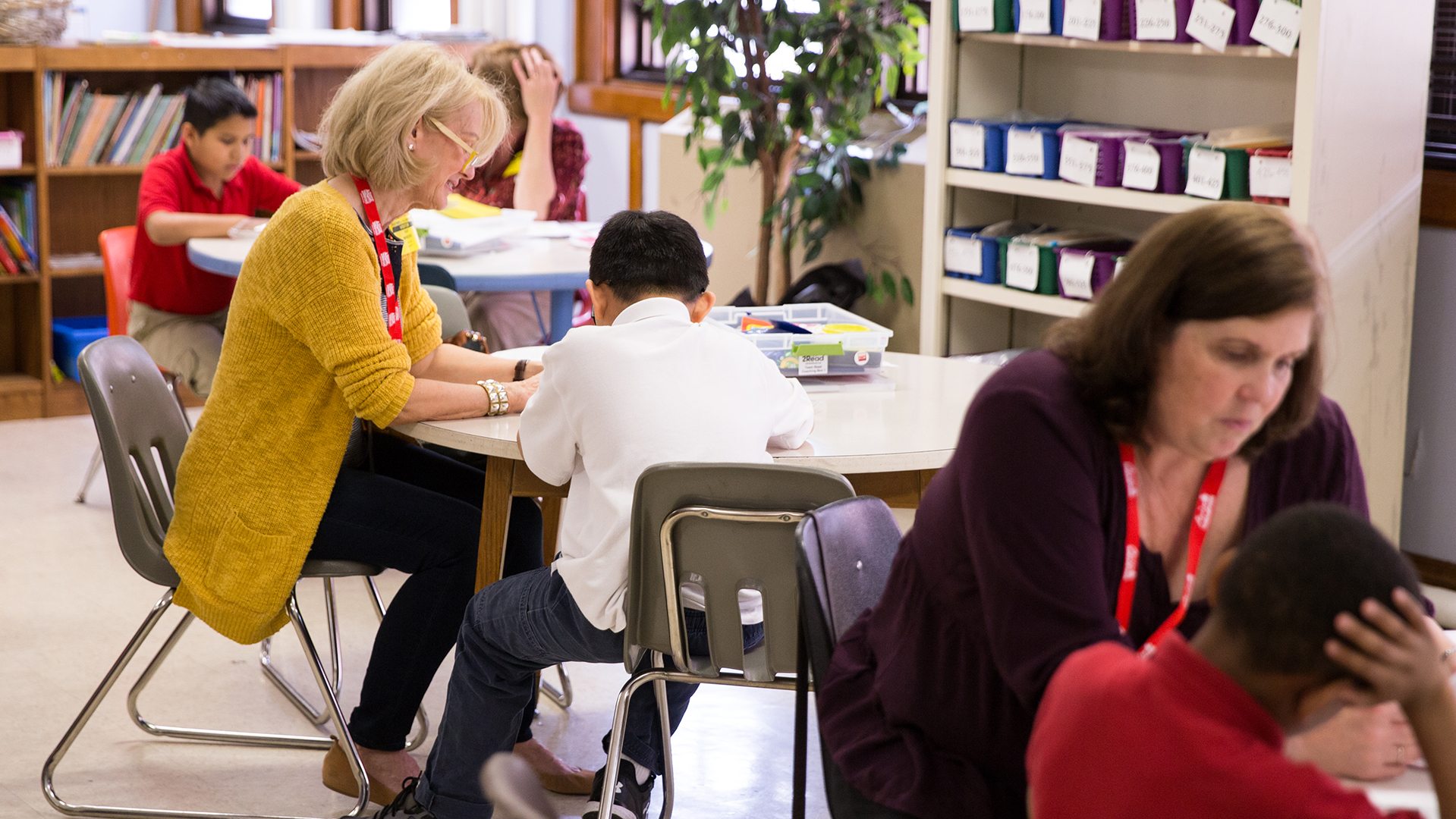
Gaines recruits those volunteers wherever she goes, sometimes on purpose, sometimes when her excitement about the program spills over into conversation after conversation.
One accidental recruit was David Melber. He’s the president of Send Relief, which focuses on connecting churches to ministry opportunities.
“I wound up at the same table as Donna and Steve at a dinner,” Melber said. He brought up poverty; she brought up Arise2Read. They talked all evening. A few months later, he came out to meet with Donna, her volunteers, and some school officials.
“It’s a very simple, easy program,” Melber said. “There’s no reason this couldn’t be implemented all over.”
Specifically, there was no reason that Send Network church planters—who focus on cities—couldn’t use the program. “In the bigger cities, the more overpopulated the schools become, the more students fall behind,” he said.
Volunteers get snagged on the numbers—the rate of poverty, the rate of Arise2Read’s success—and stay for the children.
Education is a great tool for helping to break the cycle of generational poverty, and that’s both hopeful and crucial for an organization that has “a lot of programs addressing the symptoms” of that poverty, Melber said.
Gaines trained Send Network planters at two conferences last year; another is scheduled for March. This time, they’ll videotape her to make it faster and easier to get the information out to planters.
It can’t come soon enough. Gaines has already fielded calls from interested planters in 12 different states.
Low Cost
The best news for both planters and schools—beyond the success the program has seen—is its low cost. Gaines pays for the flashcards, games, and books with grants, though sometimes a church or business will “adopt” a school and foot the $9,300 annual cost.
It’s worth it, Melber said.
“Every human has value and worth,” he said. “Seeing a need in a young student and meeting it for the purpose of building a relationship to minister not only to them but to their family—that’s a natural logical progression.”
Working in public schools—where volunteers can’t openly share their faith—doesn’t bother Melber.
The best news for both planters and schools—beyond the success the program has seen—is its low cost.
“There are at times certain regulations or boundaries that we have to adhere to in public settings, but that doesn’t mean you throw your faith out,” he said. “To say, ‘You can’t pray in a school, therefore the church has no place in a school’—that’s not correct. You may not be able to publicly assemble for prayer, but there are attributes—the fruit of the Spirit—that God wants us to live out. There are no limitations placed on the general care of a human being.”
Gaines isn’t the only one in Memphis to have implemented a volunteer-based reading program, and she knows she doesn’t have all the answers.
“If we come across something that works better—or someone else does—we’ll pass that on,” she said. “God puts his body together in such a way that we need each other. . . . It’s been so fun to see the body of Christ come together to partner across denominational and racial lines. It’s really encouraging to see where God has brought us.”
“The Most Practical and Engaging Book on Christian Living Apart from the Bible”
 “If you’re going to read just one book on Christian living and how the gospel can be applied in your life, let this be your book.”—Elisa dos Santos, Amazon reviewer.
“If you’re going to read just one book on Christian living and how the gospel can be applied in your life, let this be your book.”—Elisa dos Santos, Amazon reviewer.
In this book, seasoned church planter Jeff Vanderstelt argues that you need to become “gospel fluent”—to think about your life through the truth of the gospel and rehearse it to yourself and others.
We’re delighted to offer the Gospel Fluency: Speaking the Truths of Jesus into the Everyday Stuff of Life ebook (Crossway) to you for FREE today. Click this link to get instant access to a resource that will help you apply the gospel more confidently to every area of your life.

































